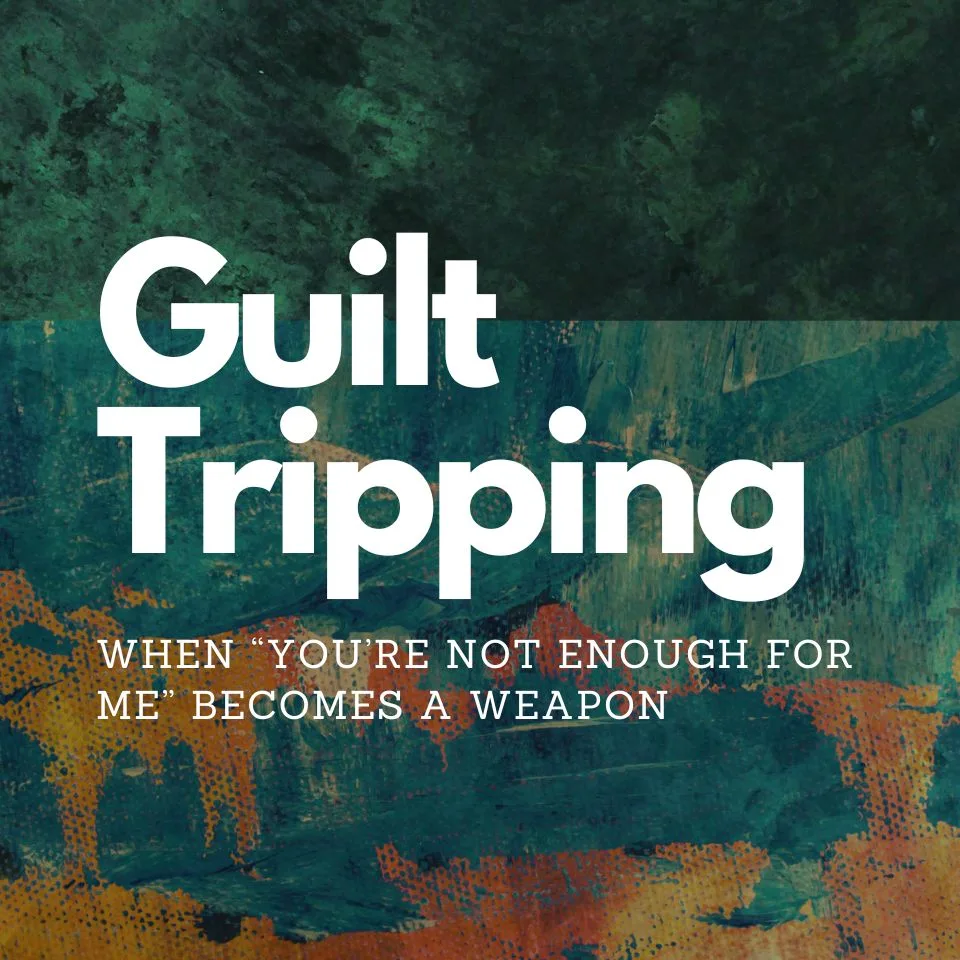Guilt is a powerful emotion. When wielded by manipulative persons, guilt is capable of twisting our perceptions and behaviours. For those who are not familiar with the term, guilt trip is a tool to bend us to someone else’s will, exploiting our desire to please and avoid disappointment in the eyes of our loved ones. They will make you feel negatively about yourself – hence having guilty feeling.
Guilt trip can be a subtle form of manipulation that often leaves us feeling overwhelmed by false guilt. While genuine guilt arises from a recognition of our fault, false guilt is the manufactured guilt imposed upon us by others. But how do we recognise this manipulation, and more importantly, how do we break free from its suffocating grip?
Yes, I’ve been through it all
Looking back to my personal experience, I can say there are small red flags of guilt tripping in relationships. In a past long-term relationship, I found myself constantly being compared against my partner’s ex. One particular ex, just because that person had more money, overseas education, and so on. The comparison left me feeling inadequate. Over five years of my relationship, I lived in the shadow of their ex. The situation casting doubt on my worthiness and leaving me scrambling to prove myself at every turn.
The guilt trip manifested in various ways, from subtle passive-aggressive text messages to outright comparisons. “It should be me living in a villa in Bali right now” – right after they saw an Instagram post of said ex. “My ex fulfilled my dream by taking me to Europe, how long should I wait for you to take me there?” – right after we spent holidays in Asian countries (yes, it happened several times).
Each subtle jab served to reinforce my feelings of inadequacy and keep me tethered to their side. I was convinced that I needed to do more to live up to their expectancy.
The Signs of Guilt Trip
So, how to recognise this manipulation technique? Here are 5 symptoms of a guilt trip:
- Constant Comparisons. Your loved one continually pits you against an idealised version of their past relationships, leaving you feeling not enough for them.
- Negative Remarks. Subtle digs and snide remarks to make you feel unconfident. The subtle comments about how only they who put efforts in the relationship.
- Silent Treatment: After a fight, your significant other withdraws their affection and giving you the cold shoulder. They just wait for you to admit your mistakes and beg for their forgiveness. If they said yes, these said mistakes may be the next weapon of guilt trip.
- Playing The Victim. Regardless the circumstances, you are the bad guy and they are the innocent victim. Playing the victim card will emphasise their sufferings to manipulate your emotions.
- Public Displays. Guilt trip extends beyond private interactions. They may mention it in social media or public forums to shame and push you to comply.
The Toll of Guilt Trip

Having been in this kind of relationship over the years, I can say that guilt trip have took a toll on my mental and emotional well-being. What I felt is resentment, not towards my ex, but for myself. I found myself sinking deeper into cycle of self-doubt and self-blame. The constant pressure to measure up, to be more, left me exhausted and depleted. Why I can’t be like their ex, why I’m not as successful as them, and so on. I sacrifice time, money, and even my own happiness in a bid to win approval.
I acknowledge that I may not be a saint during our time together. But even after the relationship ended, the residue of guilt tripping still lingers, with my ex subtly reminding me of past mistakes in casual conversation. The scars of guilt trip run deep, leaving lasting wound that take time and effort to heal.
Breaking Free from the Cycle
It is important to remember that guilt trip is often a reflection of the other person’s insecurities and manipulative tendencies. It is not a true indication of your worth or actions. If you are able to recognise this, you can begin to detach yourself from the negative emotions associated with guilt tripping.
Based on my experience, here is what I can tell you to stop the guilt tripping:
- Seek Support. Reach out to a trusted friend or family for an objective perspective on your situation. Their insights can offer clarity and help you distinguish between genuine concerns and manipulative tactics.
- Listen to Your Gut. Trust your instincts to guide you towards what feels right for you. If something feels off or uncomfortable, listen to that feelings and set boundaries accordingly.
- Stay Firm and Say No. Tell them honestly that you are in an uncomfortable position because of their comment. Let them know when their behaviour crosses a line and refuse to be manipulated into compliance.
- Maintain Distance if Necessary. If guilt tripping persists despite your efforts to address it, consider stepping back from the relationship temporarily. Distance can provide clarity and space for both parties to reassess their behaviours and priorities.
- Practice Self-care. Take time to prioritise your own well-being. You deserve to be treated with respect and kindness. Engage in activities that bring you joy and fulfilment.
Ready to reclaim your peace of mind? Click here to purchase "Let Go of The Guilt" by Valorie Burton #afflink
Conclusion
In conclusion, acknowledging and breaking free of guilt trip cycle requires courage, self-awareness, and a willingness to prioritise your own well-being. By recognising the signs, setting boundaries, and seeking support, you can break free from the suffocating grip of manipulation and reclaim your sense of self-worth.
Remember, you deserve more than just being a convenience in someone else’s life. Trust in your worth and never settle for anything less than the respect and love you deserve.
Author: Francesca Ropa
Miserable is only a concept. Writes fictions and human interest stories. Days spent in rugged Middle Earth.The Haptic Room is supported by our readers. Our site may contain links to affiliate websites, and if you make a purchase through these links, we receive a commission to support our site.

